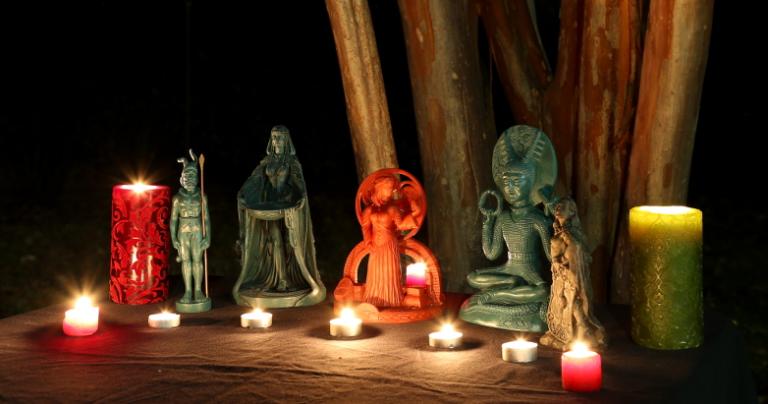Weekly offerings and devotions are a part of my regular spiritual practice. Sunday evening is for the Morrigan, Monday is for my ancestors, and Wednesday is for Cernunnos. Tuesday (most weeks, anyway) is for someone I’m not yet ready to talk about publicly. I say a prayer of invocation, I make offerings (usually a libation), and then I listen. This is the most intimate time of my regular practice.
Some weeks I hear nothing. Most weeks I hear something along the lines of “keep doing the work.” In one of them last week (which one is not important) I heard “it’s time to move further off the map, and further away from distractions.”
And I do not think I am the only one hearing this call.
What is it you want most?
“For what we want most… there is a cost must be paid in the end” – Tia Dalma, Pirates of the Caribbean: At World’s End
Our individual desires stand in an interesting spot. On one hand, the wants of any one particular creature are ultimately irrelevant. On the other hand, our wants motivate us to work toward them, and that often helps advance the greater good.
While there is value in the Christian idea of self-denial and the Buddhist idea of non-attachment, at the end of the day you’ll do best at something you’re passionate about. That deep desire keeps you going when things get hard or when a routine has to be maintained day in and day out. Desire means you will spend more time thinking about something, practicing it, and playing with it, which means your knowledge and skills will grow.
It is honorable and virtuous to do what must be done even though you don’t want to do it. Yet there is very little in life that truly must be done, and most of that is simply keeping the commitments you have already made.
What I want most right now is to continue exploring the depths of Pagan and polytheist devotion and magic.
You’ll never know what you want until you do it
As a kid I wanted to be a baseball player. I played two years of Little League and found I was really bad at it (sometimes wanting isn’t enough, but that’s another post for another time). As an adult I wanted to be a corporate executive. I got on the track to advance in the corporate world and found I didn’t like it.
If at some time in my late 20s you had told me I’d find happiness as a Druid, priest, and writer, I would have laughed at you. Oh, I always wanted to be a writer, but I thought a writer was someone who stayed home all day and made millions of dollars. The idea that I’d gladly spend countless hours at the keyboard for a fraction of minimum wage – let alone even more countless hours doing religious work for no pay – was unthinkable.
Yet here I am. I’m a Pagan because I started reading Wicca 101 books and casting silly spells for silly reasons. I’m a Druid because Wicca didn’t work for me and I decided to try something different. I’m a priest because I had an ecstatic experience of the Forest God and I wanted to learn as much from it as I could (and because I wanted to do it again). I’m a writer because I wanted to work through some religious issues and I started a free Blogger site.
And also, I’m not a kabbalist or a religious scholar or a UU minister because I took steps down those paths and figured out fairly quickly I didn’t have much passion for them.
What is it that you think you want? Go for it. It’s OK to fail, but fail fast and learn from your failures. Sooner or later you’ll hit the one you really want. Exploration and experimentation are part of the cost that must be paid for what we want most.
I didn’t know “off the map” work existed when I started. But I’ve come far enough down this path to discover my passion for it.
What are you trying to bring along for the ride?
Very few of us are single-minded. Even if we know where our passion lies and we’re committed to it, there are still other things in life we want and need. “Balance” is often a cliché in the Pagan community (or worse, an excuse for mediocrity), but a local friend once relayed a message to me: “too much speed and too much effort, without rest, will kill the vintner as well as the wine.”
There is a reason some monastic orders live lives of such simplicity they border on deprivation: they want to eliminate as many distractions as possible from their worship and contemplation. We need not copy their rules exactly, but the fact remains that there are only so many hours in a day. Some must be devoted to rest. Some must be devoted to relaxation – to enjoying “guilty pleasures” for which we should feel no guilt, because they bring a bit of joy and help us go back to our life’s work with a fresh start.
But beyond that, secondary concerns distract us from our true passions. Do you enjoy a couple of TV shows, or is your life tied up in fictional universes and the mundane lives of celebrities? Do you enjoy good food or are you obsessed with cooking and restaurants? Are you a responsible citizen or are you obsessed with politics? There’s much to be said for dressing well, but Steve Jobs wore the same black turtleneck and jeans every day – it was one less thing to distract him from the work he wanted to concentrate on.
This isn’t a question of “good” or “bad” activities or even a question of moderation. It’s a question of time management. The more hours you spend on secondary passions, the fewer hours you have to spend on primary passions.
There are some interests in my life that are good and healthy and enjoyable, but I’m going to have to cut them back (or rather, crowd them out) because they’re taking time away from my deepest callings. This is part of the cost that must be paid.
What is taking time away from your deep passion and your great work?
Getting started: something is better than nothing
Deep callings do not come to us fully formed. We have an image or an idea of what it will look and feel like, but until we start doing it we don’t really know what all is involved. Yet too many of us look at these imagined end states, realize we can’t get there right away, and conclude it’s hopeless. And so instead of doing something that will move us closer to our goal, we despair and do nothing.
This is not only a beginner’s problem.
I have a vision of where this “off the map” work will take me. But it is a vague, obscured vision. I can’t create a detailed project plan with timelines and checkpoints. All I can do is start walking in that direction, with the realization that I may not get there (where ever “there” is) in this lifetime.
Our mainstream culture talks about “having faith” that everything will work out OK, even if we have no reason to expect it will. Pagans aren’t big on that kind of faith. But we can be faithful to the callings of our Gods and ancestors, and trust that doing something will be good and helpful, even if it may not be everything we wish it was.
Payment is due up front
Tia Dalma was wrong about one thing (actually, she was foreshadowing the conclusion of the story arc, but that’s not relevant here): the cost is not paid in the end. The cost is paid up front.
There is a very utilitarian, almost Protestant ethic to spiritual practice: do the work and you get the benefits. Don’t do the work and you won’t.
Oftentimes the Gods are gracious and give us things we have not earned. Their generosity is a virtue we would do well to emulate. But some things cannot be given – they can only be obtained through sustained effort.
No one could give me the experience of running a marathon, or the wisdom I gained in doing it. I cannot command the presence of the Gods in my life, but without years of devotional practice I would rarely hear Them, much less understand what They’re telling me.
Whether you want to be a marathon runner or a magician, a concert pianist or a priest, there is a high cost to being the best you can be. The down payment is due in advance, and the on-going payments never end.
I have found them to be the best investments I’ve ever made.
This is a limited altar call
Reading over this post, I see it has the feel of an “altar call.” So let me be clear: the only person I’m giving an altar call to is me. There is plenty of room in Paganism and polytheism for people who aren’t called to deep practice or to work off the map, but who simply want to honor the Gods and live good ordinary lives.
But some of us are called to deep devotional and magical practice. We are called to go off the map, and to draw new maps for those who come after us.
Some of us want these things very, very much. And they do not come for free.
There is a cost to be paid, and that cost is often high. Sometimes extremely high.
But I intend to pay it, because it is what I want most.
And I don’t think I’m the only one.


















